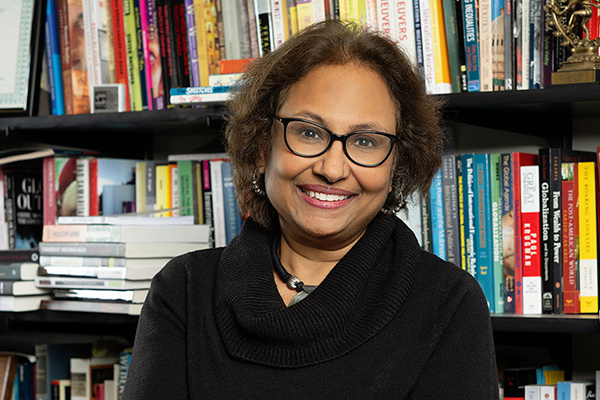The Ukraine War Comes to the Classroom
How Professor Shampa Biswas taught a course on war in real time
By Tara Roberts
Photography by Kim Fetrow ’96 of Kim Fetrow Photography
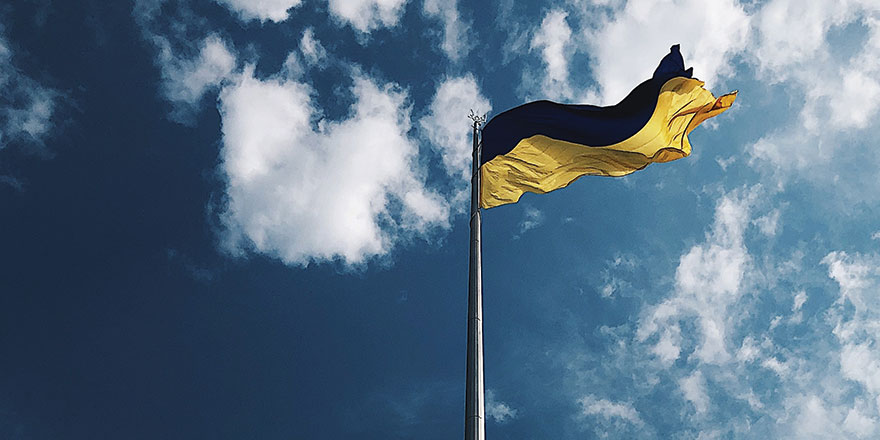
Shampa Biswas’ career at Whitman College has been devoted to encouraging students to be global thinkers. When Russia invaded Ukraine in February 2022, she knew it was a historic moment in global politics—and she wanted to give students a space to learn, think and talk about it.
“Regardless of where our students end up in their careers, they live in a world which is interconnected,” says Biswas, the Judge and Mrs. Timothy A. Paul Chair of Political Science and Professor of Politics at Whitman. “It’s really important for our students to have a sense of the global, a sense of what’s happening far away even if they think that it doesn’t directly impact their lives, because it does.”
A Course Rises Out of War
In the fall of 2022, Biswas taught a special topics seminar: Global Politics of the War in Ukraine. She followed a similar model as she did for a class during the Iraq War, developing and modifying the syllabus as issues arose.
The students began by delving into the debate among international relations scholars regarding the reasons Russia invaded. Then they explored broader issues, such as nuclear politics, war crimes, the efficacy of the United Nations and the role of independent media.
{{1-right}}
Biswas invited guest speakers to help her students think through the complicated questions, including an expert on war crime investigation who had worked in Rwanda and a former director of the U.N. Security Council Affairs Division who had been in U.N. General Assembly discussions when the war began.
Students also shared their personal experiences. When they learned about different perspectives on the war around the world, students who had studied abroad in Europe explained what it was like to be in countries close to the conflict. Students with connections to other countries raised concerns about the lack of global attention to other wars and refugees.
“I had students in the class who were from the Global South, who did ask the question, which was a reasonable question to ask, about why all this attention on the war in Ukraine when there are conflicts raging all around the world,” Biswas says. “And that led to some animated discussions among students about what matters, and what does not matter. In international politics, who gets attention, who does not?”
{{1-right}}
Opinions & Life Skills
At the beginning of the semester, what students would learn and their professor would teach wasn’t laid out neatly in a set syllabus.
“I invited my students into an uncertain journey,” Biswas says.
“Together, we learned and thought and analyzed and argued. As we collectively muddled through a constantly changing landscape, we added flesh to a skeletal syllabus.” The class read well-weathered international relations texts alongside new analyses that cropped up in real time. They explored emerging, different and shifting positions and debates about the war in Ukraine over the course of the fall.
Discussions in the classroom were sometimes heated, Biswas says, but that was part of the learning process.
“Cultivating those skills of listening well, engaging with somebody—and being willing to change your mind when somebody else convinces you—are absolutely critical skills, and skills we’re going to need even more in the polarized environment in which our students are living,” she says.
The students’ major assignments were designed to help them share the lessons they’d learned. Students wrote opinion pieces about the war and worked in small groups to produce podcasts. With funding from an internal grant, Biswas collaborated with Whitman staff members from Technology Services and the Office of Communications to help students with their projects.
“Part of the skills that I was teaching them was not just ‘think well, talk well,’ but also be able to reach others outside of the classroom in ways that are accessible.”
Listen to the Podcasts
Students created podcasts to examine how international relations can help understand war and its aftermath. Listen to the 15-minute episodes.
In Their Educated Opinions: 3 Student-Written Op-Eds
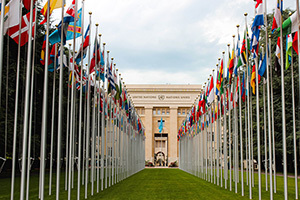
Digital Nomads in a Time of War: A Critique on Diplomacy
Russia has invaded Ukraine. What can the United Nations do?
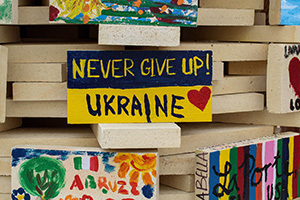
America Welcomes More Than 100,000 Ukrainian Refugees. Let’s Think Bigger.
America’s treatment of Ukrainian refugees is a reminder of our own ability to be compassionate. Our treatment of other refugees shows we still have a way to go.
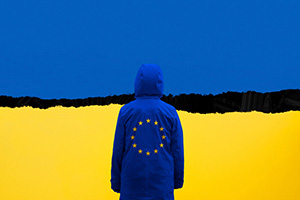
#SlavaUkraini: Bringing the War Home to Your Smartphone Screen
How Social Media Displays War to Younger Generations
